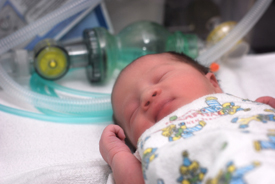

Clinical Overview
The Division of Neonatology provides services at three facilities: University of Utah, Primary Children’s Hospital (PCH) and Intermountain Medical Center (IMC). In-hospital neonatology attending and NNP coverage is provided at all three units 24 hours a day, 7 days a week. Two neonatologist provide attending coverage at each of the sites during the day. At night, there is one neonatologist covering both University of Utah and PCH NICUs and one neonatologist at IMC, each with its own NNP coverage.
University of Utah
The 48+ bed Level III NICU provides care for critically ill newborns with gestational ages ranging from approximately 22 weeks to over 40 weeks. The unique layout of the unit allows for passage of the neonate from the delivery room directly into the NICU for resuscitation to occur in the unit. This is a high volume delivery center with a robust maternal-fetal medicine and high-risk delivery service, as well as a referral center for high-risk maternal and neonatal transports with over 600 NICU admissions annually. Infants that are known prenatally to require subspecialty care at Primary Children’s Hospital are delivered at the University of Utah NICU and transferred to PCH by our transport team via the connecting enclosed walkway following resuscitation and stabilization. The NICU utilizes both conventional and high frequency vents (HFOV and HFJV), total body cooling, inhaled nitric oxide (iNO) and subspecialty consultation from Primary Children’s Hospital. Additionally, there is special expertise in the care of the extremely low birth weight infants. First year pediatric interns rotate through this NICU allowing for ample teaching opportunities.
Primary Children’s Hospital
The 52 bed NICU is the neonatal referral center for complex medical and surgical management for the Mountain West region (consisting of Utah and parts of Nevada, Idaho, Montana and Wyoming) and is the state’s only Level IV NICU. There are approximately 430 NICU admissions annually and 10 extracorporeal membrane oxygenation (ECMO) runs in the NICU each year. The NICU utilizes both conventional and high frequency ventilation (HFOV and HFJV), total body cooling, iNO, ECMO and all subspecialty consultation services. Neonatal ECMO is performed in the NICU with the neonatology team managing the care in coordination with our surgical colleagues. There is vast and broad exposure to both pre- and post-surgical management of general surgical cases (such as congenital diaphragmatic hernia, gastroschisis, tracheoesophageal fistula/esophageal atresia, intestinal atresias) as well as subspecialized surgical management including neurosurgery, ENT, cardiothoracic, urologic, ophthalmologic, etc. Some surgeries are additionally performed in the NICU if the neonate is too ill to travel to the operating room. With our unique patient population, there is also excellent exposure to complex congenital anomalies, palliative care and long-term management of chronic/complex conditions (managed with a special care team called Karp Team) such as infants who are chronically ventilated or those with short bowel syndrome.
The fellow is also responsible (with attending support) for carrying the “transport phone” where they act as the medical control for local and regional neonatal transports utilizing two transport services (each with ground, helicopter and fixed wing capabilities) as well as taking neonatal consult phone calls from local and regional pediatricians and neonatologists.
Intermountain Medical Center
For fellows that are interested in pursuing more clinical experience, there is an option to rotate through the 48 bed Level III IMC NICU during the third year of fellowship. In addition to providing both conventional and high frequency ventilation (HFOV and HFJV), total body cooling, iNO, and laser surgery for retinopathy of prematurity, there is also exposure to the “bread and butter” of neonatology, including hypoglycemia and respiratory distress.
